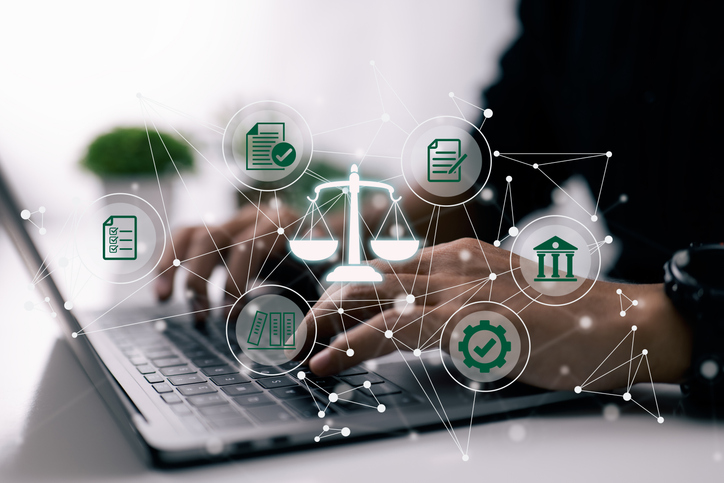For UK and international tech companies, digital transformation is less of a buzzword and more of a necessity. From AI-first platforms and data-driven SaaS products to cross-border marketplace models, founders are typically under pressure to build fast, scale faster, and keep up with an increasingly complex regulatory environment.
As part of this, ‘legal’ is often a line on a budget, a cost to keep as low as possible. It is a thing that tech founders looking to scale fast generally recognise as necessary, but principally associated with fundraising, disputes, GDPR questions, occasional contract templates and general security.
However, alongside those things, as businesses have become increasingly digital, the saleable assets which they are developing have become increasingly interlinked with their data collection, and ownership of developed digital assets, such as machine-learned or AI knowledge bases. Unlike with traditional businesses where IP ownership is clearer cut, these modern types of businesses generally need to be extra vigilant to ensure that they own what they think they own, and therefore importantly, can sell what they think they can sell in an exit scenario.
At Accelerate Law, we’ve worked with internationally recognised scale-ups and hundreds of UK start-ups and scale-ups navigating rapid growth. We’ve seen the same issues emerge again and again: reactive legal ops, shaky data practices, and IP blind spots that put the brakes on innovation, unsettle investors and derail deals, including proposed acquisitions.
So, what can you do from a legal perspective to ensure that data and digital IP remain an unencumbered asset with a tech-heavy business?
Read on for the whole guide or go straight to your preferred section.
- The legal part of tech: adjusting mindsets
- The default position: you may not own what you think you do
- Lay clear legal foundations to build your house on
- What a legal strategy actually looks like
- Legal strategy evolves with growth
- How to implement: a fractional in-house lawyer without the overhead
- Don’t let legal be the thing that slows you down
- Key takeaways
The legal part of tech: adjusting mindsets
Firstly, we can adjust our mindsets and acknowledge this legal element of technology development as a foundational pillar of digital strategy, especially when your product is data-rich, AI-driven, or fundamentally reliant on intangible assets.
Even lawyers know it – legal is often treated as an inconvenient checkbox, a necessary means to an end. Incorporate the company, sign the contracts, close the round. Done. Lawyers will support the process and everyone wins.
But when your entire business model relies on how data is captured, trained on, transformed or commercialised, legal can’t just be a back-office function. It is too intertwined with the infrastructure that makes your model viable and saleable down the line.
Without a clear strategy for ownership and rights from the outset, companies risk building on sand. And in tech, the consequences are particularly damaging:
- You might not be able to commercialise your AI outputs
- You may lose IP leverage in a future acquisition
- You could face disputes or data subject complaints that erode trust with partners, regulators and customers
Especially in an AI-powered world, founders need to ask early: what are we building, and do we actually own it?
The default position: you may not own what you think you do
Let’s unpack that. In English law, the default position on intellectual property is clear: the creator of the IP owns it, unless a contract explicitly says otherwise. The same logic applies to data.
So, what happens when you’re training an AI on user behaviour, generating outputs from third-party sources, or enriching datasets using tools built by contractors or vendors?
The answers are rarely straightforward.
- If you haven’t clearly assigned rights (in your contracts, platform terms, or licensing model), you might not legally own the code, model outputs or data derivatives you’re building your business on.
- If your data is only pseudonymised, you may still be processing personal data under GDPR, and subject to its strict controls.
- If an AI tool is ingesting or generating content, you’ll need to understand not just copyright law, but who holds the rights in the model outputs and whether you’re even allowed to use them commercially.
In some cases, you can’t own the data itself, but you can structure agreements that give you exclusive usage rights, enable licensing, or limit downstream liability. However, those agreements need to be structured that way in advance to ensure this is the case as it doesn’t work retrospectively. That’s where a proactive legal strategy plays a crucial role.
Lay clear legal foundations to build your house on
In the early stages of a company, founders often hear the phrase, ‘Just get moving’. Build the MVP, test with users, don’t let legal slow you down. Fail fast and iterate. That’s generally good advice in very early stages. For example, sometimes clients will come to us wanting to be almost too proactive, wanting very detailed contracts envisaging every possible outcome and risk before a product is even close to launch, and our advice is often to scale things back or just to come back once ideas are more fixed. Otherwise, they and we are expending too much energy planning for something which is highly likely to change and isn’t ready.
That being said, as soon as you start scaling, raising investment, entering new markets, bringing on large clients or building proprietary systems, the stakes change. So do the expectations.
Your investors will start asking in their due diligence:
- Do you own the IP outright?
- Is your data collection lawful and your usage model defensible?
- Are there any legacy risks from early vendor arrangements or open-source usage?
At that point, retrofitting your legal foundations is no longer optional, but it’s urgent, expensive, and risky.
A smart commercial legal setup builds with scale in mind from day one. It doesn’t mean over-lawyering or stifling innovation. It means having a framework in place that evolves with your business and protects its most valuable assets along the way.
What a legal strategy actually looks like
So, what does it mean to build a foundational legal strategy for a tech business? It’s not about lengthy memos or endless red tape, but rather it’s about creating structure across four critical areas:
- Data ownership and licensing
- Define what data is collected, how it’s processed, and what rights you have to use it
- Put in place user terms, partner agreements and policies that align with this. The documents themselves can be lighter touch in early stages, so long as the key ownership and usage points are covered.
- IP protection
- Assign all IP created by employees, contractors and vendors to your company
- Register key trademarks or patents, if relevant, and protect proprietary processes
- AI use and risk management
- Clarify how third-party AI tools are used, and what rights you have over outputs
- Build transparency into your model training, especially if using customer data (and even more so with sensitive data)
- Commercialisation and exit readiness
- Structure contracts that enable scalable licensing or resale
- Prepare for investor or acquirer scrutiny, so legal isn’t the thing that delays or derails an investment or acquisition deal
When legal is embedded in the business strategy (not bolted on as a fix), it becomes a growth enabler rather than a potential blocker. It is often a huge source of frustration and expense when a potentially transformational deal is held up because the investor’s or acquiror’s lawyers raise ‘red flags’ over data and IP ownership and usage in their due diligence reports that the target company (i.e. your start-up).
Legal strategy evolves with growth
Legal strategy and work is ultimately about risk management. What we see here is that in businesses relying on digital ownership, the risks are higher earlier, so even early-stage businesses in this field generally ought to take proactive steps to secure the digital ownership. That risk then grows with time as the stakes get higher and there is more on the line, and the time and energy levels going into these questions naturally increase.
So, when it comes to legal strategy in this area, the important thing at the start is simply to have one. It doesn’t need to be incredibly detailed or strenuous, but it can set foundations for future growth and development. For example, initially you could set out a simple Q&A:
- What are the different types of data we are developing and will hold?
- Who owns each type of data?
- If we don’t own it, on what basis can we use it?
- Are we allowed to commercialise it or sell it?
Then as things develop, that strategy can build out. For example:
- Developing a playbook for these points when interacting with corporate clients and partners.
- Setting circumstances in which the general rules can change and setting parameters around that.
- Preparing specific contracts to record different commercial models.
- Adjusting approaches for new jurisdictions.
- Setting detailed internal processes and training.
- Preparing for investor or acquiror due diligence.
In other words, legal isn’t static. Your legal infrastructure can grow with your product, your market, and your team.
How to implement: a fractional in-house lawyer without the overhead
One of the reasons many companies delay legal strategy is because of the cost and ultimately a lack of trust in the industry. Law firms are often very expensive and bureaucratic and hiring a full-time General Counsel feels premature. So, they fall back on old templates and ChatGPT which is good but only half baked. That’s where fractional legal support can be highly effective, especially for start-ups.
At Accelerate Law, we operate as a fractional in-house counsel team with a start-up sector specialism, blending the deep company-specific insight of an internal lawyer with the flexibility and expertise of a specialist legal partner in the tech field.
Every company is different though and the important thing is to follow your gut instincts and work with people that fit the way you like to work and who give you comfort to know things will be taken care of reliably. Ultimately, it’s about putting you in the best position to succeed.
Don’t let legal be the thing that slows you down
In situations where your product is your data, and your competitive advantage lies in your IP, legal is best tackled head-on and not as an afterthought. It is often a core part of building a resilient, investable, and scalable business.
Legal doesn’t have to be painful, slow or confusing. With the right support around data and IP ownership, it becomes a quiet advantage, one that makes your company stronger, your roadmap faster, and your deals smoother.
Key takeaways
- You must be vigilant in understanding what IP you own.
- If your entire business model relies on how data is captured, trained on, transformed or commercialised, legal can’t just be a back-office function. It is too intertwined with the infrastructure that makes your model viable and saleable down the line.
- Assume you don’t own IP as default.
- In some cases, you can’t own the data itself, but you can structure agreements that give you exclusive usage rights, enable licensing, or limit downstream liability.
- Your data strategy should be based on data ownership and licensing; IP protection; AI use and risk management; and commercialisation and exit readiness.
- Your legal strategy will evolve as you grow.
Simon Davies is the founder of Accelerate Law.
Read more
How do you build an adaptable data platform? – In this article Barry Green guides you through the components to consider when building a adaptable data platform
Why synthetic data is pivotal to successful AI development – Geoff Barlow explains how synthetic data is helping businesses to overcome the barriers to AI development
Data storage problems and how to fix them – Digitising data storage can be a daunting task and some of the biggest barriers businesses face are with infrastructure, costs, security, compliance and people, says Kubair Shirazee, founder of AgiliTea










